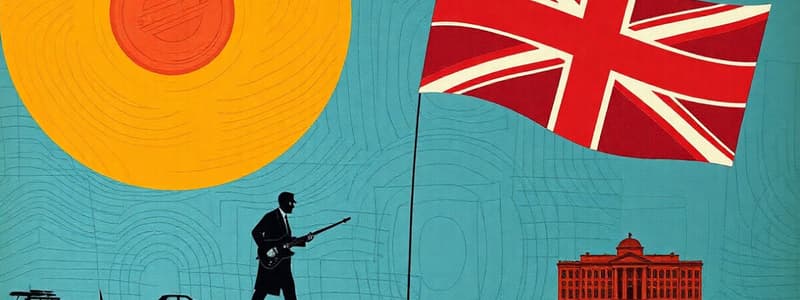Podcast
Questions and Answers
What literary technique became prominent during the Modernist movement in British literature?
What literary technique became prominent during the Modernist movement in British literature?
- Rhetorical questions
- Narrative framing
- Metaphorical language
- Stream of consciousness (correct)
Which period is recognized as Modernism in British literature?
Which period is recognized as Modernism in British literature?
- 1940 to 1970
- 1850 to 1890
- 1880 to 1920
- 1890 to 1940 (correct)
What significant global event influenced the negative sentiment during the Modernist period?
What significant global event influenced the negative sentiment during the Modernist period?
- World War I (correct)
- The French Revolution
- The industrial revolution
- The Great Depression
What was the main purpose of the Berlin Conference of 1884-1885?
What was the main purpose of the Berlin Conference of 1884-1885?
Which author is NOT typically associated with the Modernist movement in British literature?
Which author is NOT typically associated with the Modernist movement in British literature?
What was a major motivation for European countries during the Scramble for Africa?
What was a major motivation for European countries during the Scramble for Africa?
Which writer's work reflects the exploitation of native people during the colonial period?
Which writer's work reflects the exploitation of native people during the colonial period?
Which countries were considered major players during the Scramble for Africa?
Which countries were considered major players during the Scramble for Africa?
By what year had the majority of Africa been colonized by European powers?
By what year had the majority of Africa been colonized by European powers?
What significant shift did Oscar Wilde's trial represent in British literature?
What significant shift did Oscar Wilde's trial represent in British literature?
What significant achievement for women occurred by 1928?
What significant achievement for women occurred by 1928?
Which writer is associated with a character that undergoes a gender change?
Which writer is associated with a character that undergoes a gender change?
What major event began in 1929, leading to widespread economic hardship?
What major event began in 1929, leading to widespread economic hardship?
Which literary work challenges traditional ideas about spring being a harbinger of hope?
Which literary work challenges traditional ideas about spring being a harbinger of hope?
Which author wrote about the experience of living in poverty during the Great Depression?
Which author wrote about the experience of living in poverty during the Great Depression?
Which poem reflects on the beginning of World War II?
Which poem reflects on the beginning of World War II?
What is one difference between 'Post-colonialism' and 'postcolonialism'?
What is one difference between 'Post-colonialism' and 'postcolonialism'?
Who wrote 'A Portrait of the Artist as a Young Man' which explores struggles with faith?
Who wrote 'A Portrait of the Artist as a Young Man' which explores struggles with faith?
What economic condition characterized both the American and British experience in the 1930s?
What economic condition characterized both the American and British experience in the 1930s?
Which of the following works reflects the decline of religious belief?
Which of the following works reflects the decline of religious belief?
What was the primary cause of the Second Boer War?
What was the primary cause of the Second Boer War?
Which war coincided with the rise of modernist literature and the feeling of fragmentation?
Which war coincided with the rise of modernist literature and the feeling of fragmentation?
What literary technique became prominent among modernist writers after World War I?
What literary technique became prominent among modernist writers after World War I?
What was the significance of T.S. Eliot's poem 'The Waste Land'?
What was the significance of T.S. Eliot's poem 'The Waste Land'?
Which of the following best describes the term 'alienation' in modernist literature?
Which of the following best describes the term 'alienation' in modernist literature?
How did women's roles change during World War I?
How did women's roles change during World War I?
What was a notable effect of the Second Boer War on the perception of the British Empire?
What was a notable effect of the Second Boer War on the perception of the British Empire?
What was the overarching theme of literature after World War I?
What was the overarching theme of literature after World War I?
Which group was part of the Allies during World War I?
Which group was part of the Allies during World War I?
What literary characteristic was NOT typical of modernist writers?
What literary characteristic was NOT typical of modernist writers?
Flashcards
Modernism in British Literature
Modernism in British Literature
A literary movement that emerged in Britain between 1890 and 1940, characterized by new ways of writing to reflect the rapid changes and uncertainties of the modern world.
Stream of Consciousness
Stream of Consciousness
A writing technique that mimics the flow of thoughts, jumping between past, present, and future, reflecting the fragmented nature of human consciousness.
Scramble for Africa
Scramble for Africa
A period of intense European competition to colonize and exploit resources in Africa, primarily between 1881 and 1914.
Heart of Darkness by Joseph Conrad
Heart of Darkness by Joseph Conrad
Signup and view all the flashcards
The Berlin Conference
The Berlin Conference
Signup and view all the flashcards
The Modern World
The Modern World
Signup and view all the flashcards
Modernist Writers
Modernist Writers
Signup and view all the flashcards
Colonialism in Africa
Colonialism in Africa
Signup and view all the flashcards
Diamonds and Gold in Africa
Diamonds and Gold in Africa
Signup and view all the flashcards
Colonization of Africa
Colonization of Africa
Signup and view all the flashcards
Modernism
Modernism
Signup and view all the flashcards
Modernist Literature
Modernist Literature
Signup and view all the flashcards
Modernist Literature (Post-WWI)
Modernist Literature (Post-WWI)
Signup and view all the flashcards
Imperial Decline
Imperial Decline
Signup and view all the flashcards
Post-colonialism (with hyphen)
Post-colonialism (with hyphen)
Signup and view all the flashcards
Postcolonialism (without hyphen)
Postcolonialism (without hyphen)
Signup and view all the flashcards
Postmodernism
Postmodernism
Signup and view all the flashcards
Postmodern Literature
Postmodern Literature
Signup and view all the flashcards
The Great Depression
The Great Depression
Signup and view all the flashcards
Second Boer War
Second Boer War
Signup and view all the flashcards
Guerrilla Warfare
Guerrilla Warfare
Signup and view all the flashcards
Rudyard Kipling's Changing Perspective
Rudyard Kipling's Changing Perspective
Signup and view all the flashcards
World War I: Allies vs. Central Powers
World War I: Allies vs. Central Powers
Signup and view all the flashcards
Fragmentation in Modernist Literature
Fragmentation in Modernist Literature
Signup and view all the flashcards
Alienation in Modernist Literature
Alienation in Modernist Literature
Signup and view all the flashcards
T.S. Eliot's "The Waste Land"
T.S. Eliot's "The Waste Land"
Signup and view all the flashcards
Technological Advancements in WWI
Technological Advancements in WWI
Signup and view all the flashcards
Women's Roles During WWI
Women's Roles During WWI
Signup and view all the flashcards
Study Notes
Modernism in British Literature (1890-1940)
- Era of significant societal and literary change, marked by disillusionment following WWI, technological advancements, and questioning of traditional beliefs.
- Writers explored new styles like "stream of consciousness," capturing the fragmented nature of modern life, jumping between past, present, and future.
- Key figures included Virginia Woolf, James Joyce, and T.S. Eliot.
The Scramble for Africa (1881-1914)
- European powers competed to colonize Africa for its resources (diamonds, gold).
- The Berlin Conference (1884-1885) divided Africa among European nations without African input.
- By 1914, all of Africa was colonized.
- Colonialism, and the exploitation of native populations, is highlighted in Joseph Conrad's "Heart of Darkness."
The Second Boer War (1899-1902)
- Conflict between Britain and Dutch settlers (Boers) over South African gold mines.
- Boer use of guerilla warfare challenged the British Empire's perceived invincibility.
- The war's outcome negatively impacted British perceptions of their empire and inspired other nations.
- This period affected the writing of Rudyard Kipling, evolving from celebratory to critical views of imperialism.
World War I (1914-1918)
- Assassination of Archduke Franz Ferdinand triggered a global war between the Allies (Britain, France, Russia) and Central Powers (Germany, Austria-Hungary, Ottoman Empire).
- Later, the US joined the Allies.
- Industrial advancements led to devastating new weapons like machine guns, tanks, and poison gas.
- Millions of soldier deaths resulted in widespread shock and disillusionment.
- Women entered the workforce, and writers reacted to the war's horrors.
Fragmentation and Alienation
- Post-WWI, people felt alienated and disconnected from their world.
- Modernist writers reflected this fragmentation with their writing styles.
- Techniques included abandoning traditional narratives, jumping between times, and using stream-of-consciousness.
- T.S. Eliot's "The Waste Land" is an archetype of this fragmentation.
Gender and Roles
- Women's roles significantly evolved due to men's involvement in WWI.
- Increased participation in the workforce and growing independence.
- Women gained suffrage; Emmeline Pankhurst led the movement.
- By 1928, full voting rights were achieved.
- Writers like Virginia Woolf and Dorothy Richardson explored the changing landscape for women.
Crisis of Faith and Meaning
- Questioning of traditional religious beliefs due to Darwin's theory, scientific discoveries, and WWI.
- T.S. Eliot's "The Waste Land," challenges traditional ideas about hope and faith
- James Joyce's "A Portrait of the Artist as a Young Man," showcased struggles with Catholic faith.
- Gerard Manley Hopkins' "Terrible Sonnets," demonstrated personal struggles with faith.
- Thomas Hardy, in "God's Funeral," captured the collapse of faith.
1929 Wall Street Crash and the Great Depression
- The stock market crash in 1929 triggered significant economic hardship globally.
- The Great Depression resulted in widespread poverty and unemployment.
- Events impacted writers like George Orwell ("Down and Out in Paris") and John Steinbeck ("The Grapes of Wrath").
Imperial Decline
- In the aftermath of WWI, the British Empire's power and influence began to wane.
- Writers reflected the changing status quo
- E.M. Forster's "A Passage to India" and Joseph Conrad's "Heart of Darkness" illustrated cultural clashes and the darker aspects of imperialism.
World War II (1939-1945)
- Nazi Germany's invasion of Poland marked the start of WWII.
- W.H. Auden's poem "September 1, 1939" captured the historical context's significance.
Postcolonialism
- "Post-colonialism" (with hyphen) refers to the historical period after colonialism.
- "Postcolonialism" (without hyphen) is a broader study encompassing the whole field of colonialism's effects
- Colonialism's long-lasting cultural and social influences are studied.
Studying That Suits You
Use AI to generate personalized quizzes and flashcards to suit your learning preferences.




